2-Day Adventure: Plitvice Lakes Unexplored Paths & Outdoor Activities
Plitvice Lakes National Park, Croatia
2 days





About Plitvice Lakes National Park, Croatia
Explore the breathtaking beauty of Plitvice Lakes National Park in Croatia, a UNESCO World Heritage site. This natural wonderland boasts 16 terraced lakes, interconnected by a series of waterfalls and cascades, set amidst lush greenery. The park offers well-marked trails for hiking, wooden walkways that meander around and across the water, and boat rides on the largest lake, Kozjak. Discover diverse flora and fauna, including rare bird species and European brown bears. The park is open year-round, with each season offering a unique spectacle - vibrant greenery in spring, vivid colors in autumn, and a stunning frozen landscape in winter. Plitvice Lakes National Park is a must-visit destination for nature lovers and photography enthusiasts.
2-Day Itinerary
Day 2
Hiking the Upper Lakes and Cave Exploration
Morning
Start your day with a hike to the Upper Lakes. This area of the park is less crowded and offers stunning views of the lakes and waterfalls.
Lunch
Enjoy a packed lunch at one of the park's scenic viewpoints. The park offers several picnic areas with stunning views of the lakes and waterfalls.
Afternoon
After lunch, explore the park's caves. These caves are home to a variety of wildlife and offer a unique adventure experience.
Dinner
For dinner, enjoy a meal at a local restaurant outside the park. Try some traditional Croatian dishes like peka or pljeskavica.
Evening
End your day with a visit to the park's observatory. Here, you can stargaze and learn more about the park's unique ecosystem.
Attractions in Itinerary (3)

1Lower Lakes
The Lower Lakes are a group of lakes in Plitvice Lakes National Park, known for their stunning turquoise waters and cascading waterfalls.

2Kozjak Lake
Kozjak Lake is the largest and deepest lake in Plitvice Lakes National Park. It's known for its stunning turquoise waters and the serene boat rides offered.

3Upper Lakes
The Upper Lakes are a series of twelve lakes in Plitvice Lakes National Park, known for their cascading waterfalls and diverse wildlife.
Local Food and Drinks (12)

Cevapi
Cevapi is a popular Balkan dish and a must-try in Croatia. It consists of small, grilled rolls of minced meat, usually served in a flatbread with onions and a type of sour cream called 'kajmak'. It's a common dish in the region around Plitvice Lakes National Park.

Peka
Peka is a traditional Croatian dish prepared with meat or seafood and vegetables, cooked under a bell-like dome in a fireplace. It's a slow-cooked, hearty meal that's popular in the region around Plitvice Lakes National Park.

Rakija
Rakija is a fruit brandy that's very popular in Croatia. It's often homemade and comes in a variety of flavors, including plum, pear, and cherry. It's a common drink in the region around Plitvice Lakes National Park.
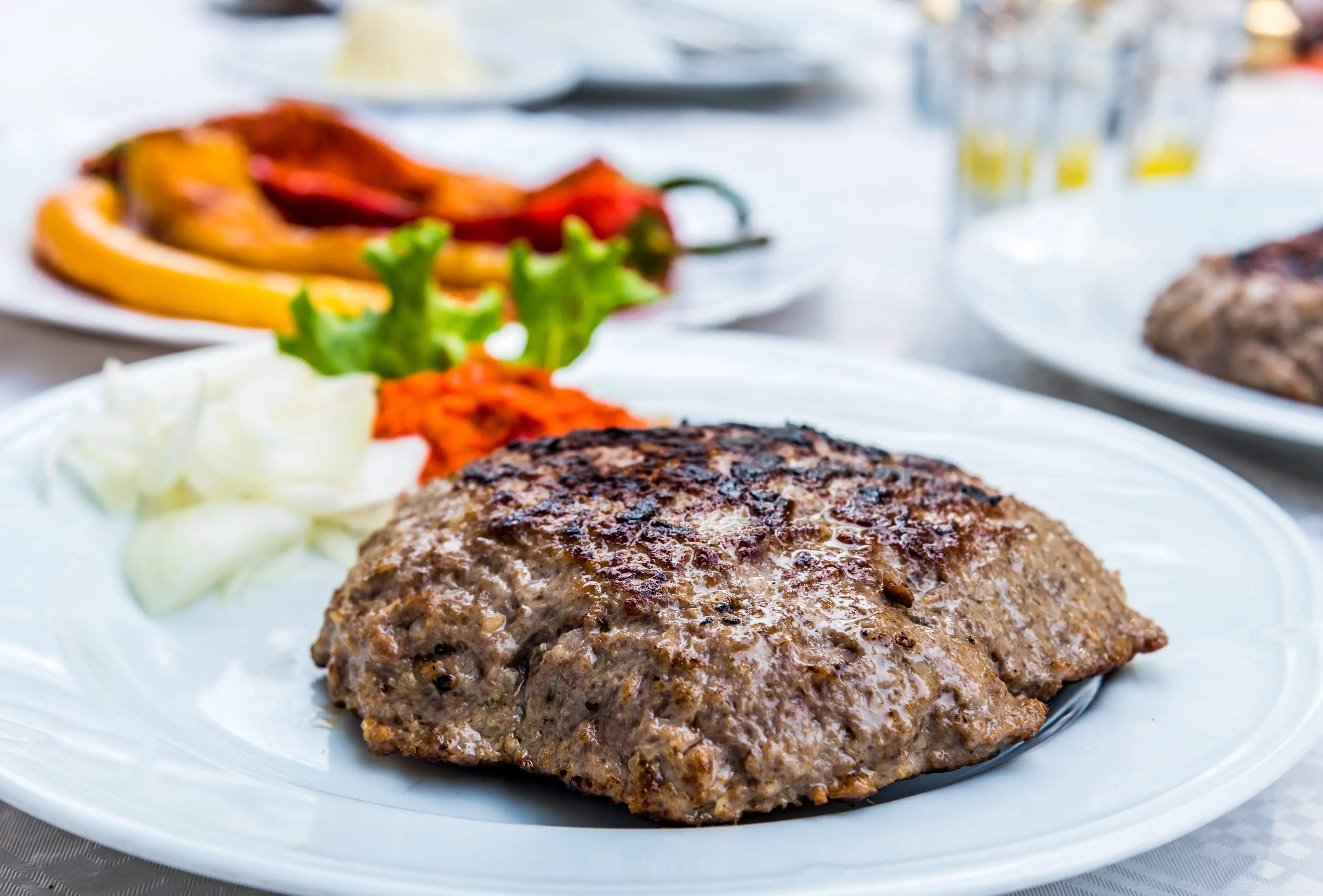
Pljeskavica
Pljeskavica is a Balkan dish similar to a hamburger. It's a patty made from a mix of meats, often served in a bun with a variety of toppings. It's a popular street food in the region around Plitvice Lakes National Park.
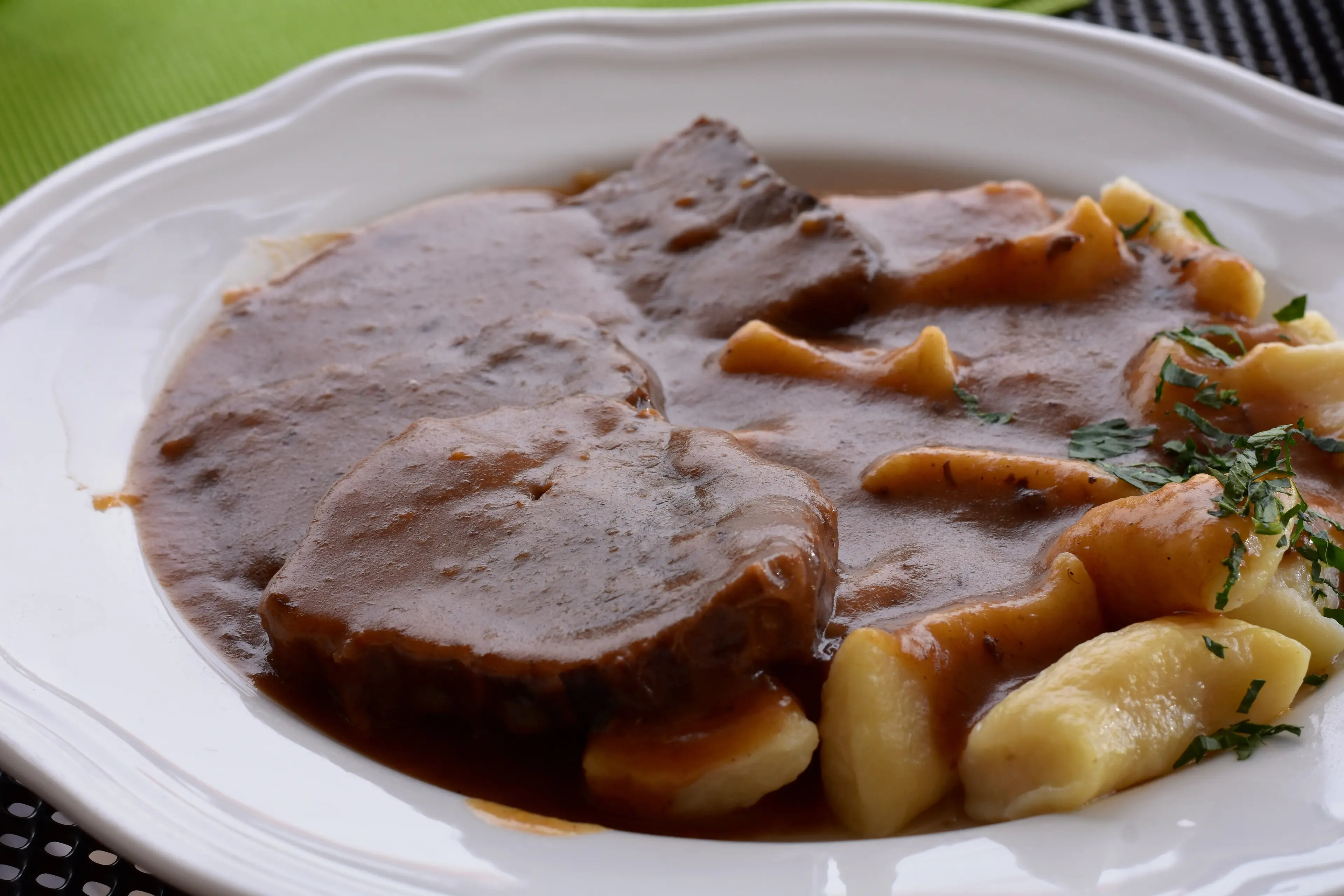
Pasticada
Pasticada is a traditional Croatian stew made from beef, prunes, and a rich sauce. It's a slow-cooked dish that's often served with gnocchi. It's a common dish in the region around Plitvice Lakes National Park.
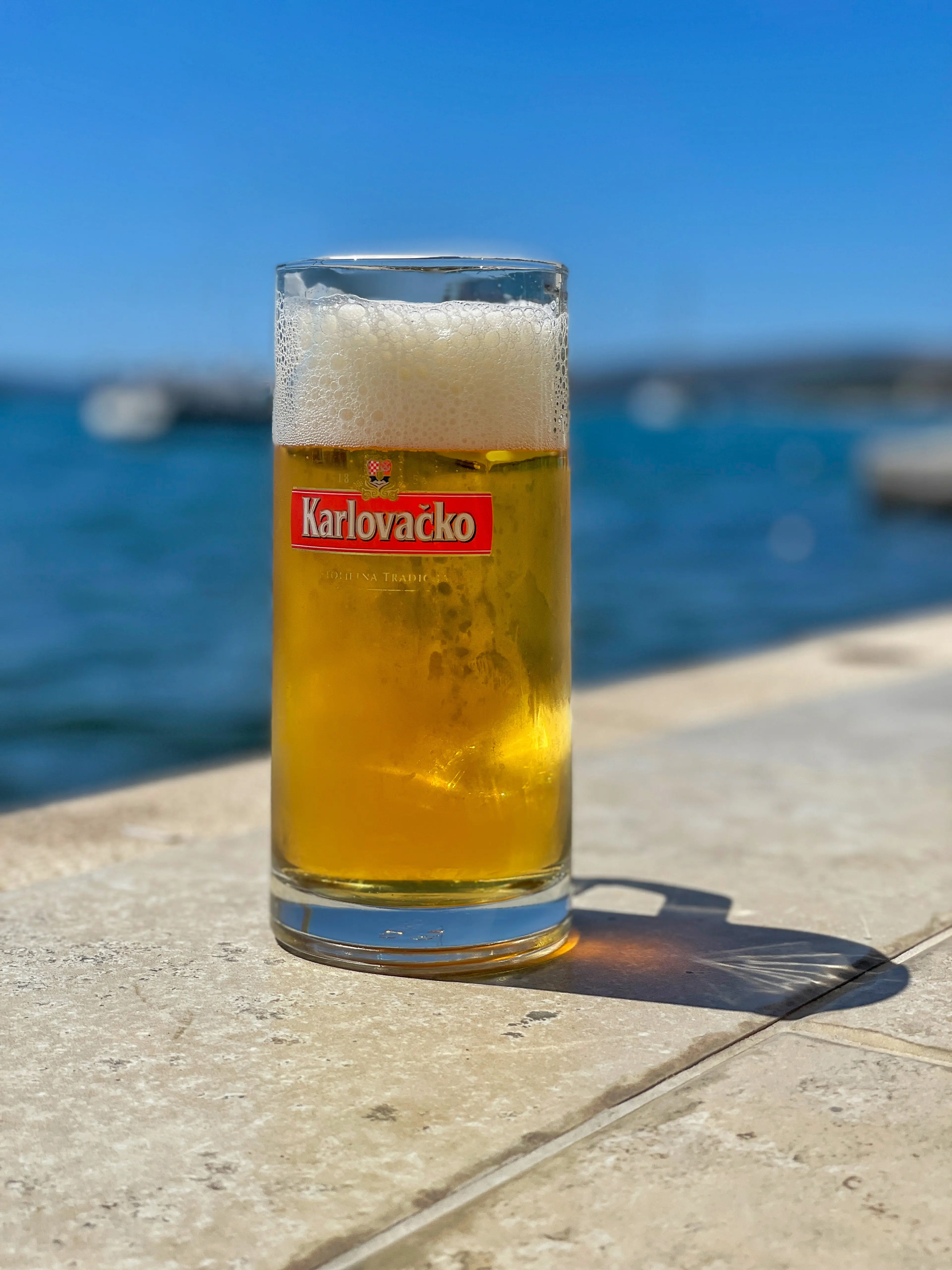
Karlovacko Pivo
Karlovacko Pivo is a popular Croatian beer. It's a light, refreshing lager that's brewed in the nearby town of Karlovac, making it a local favorite around Plitvice Lakes National Park.
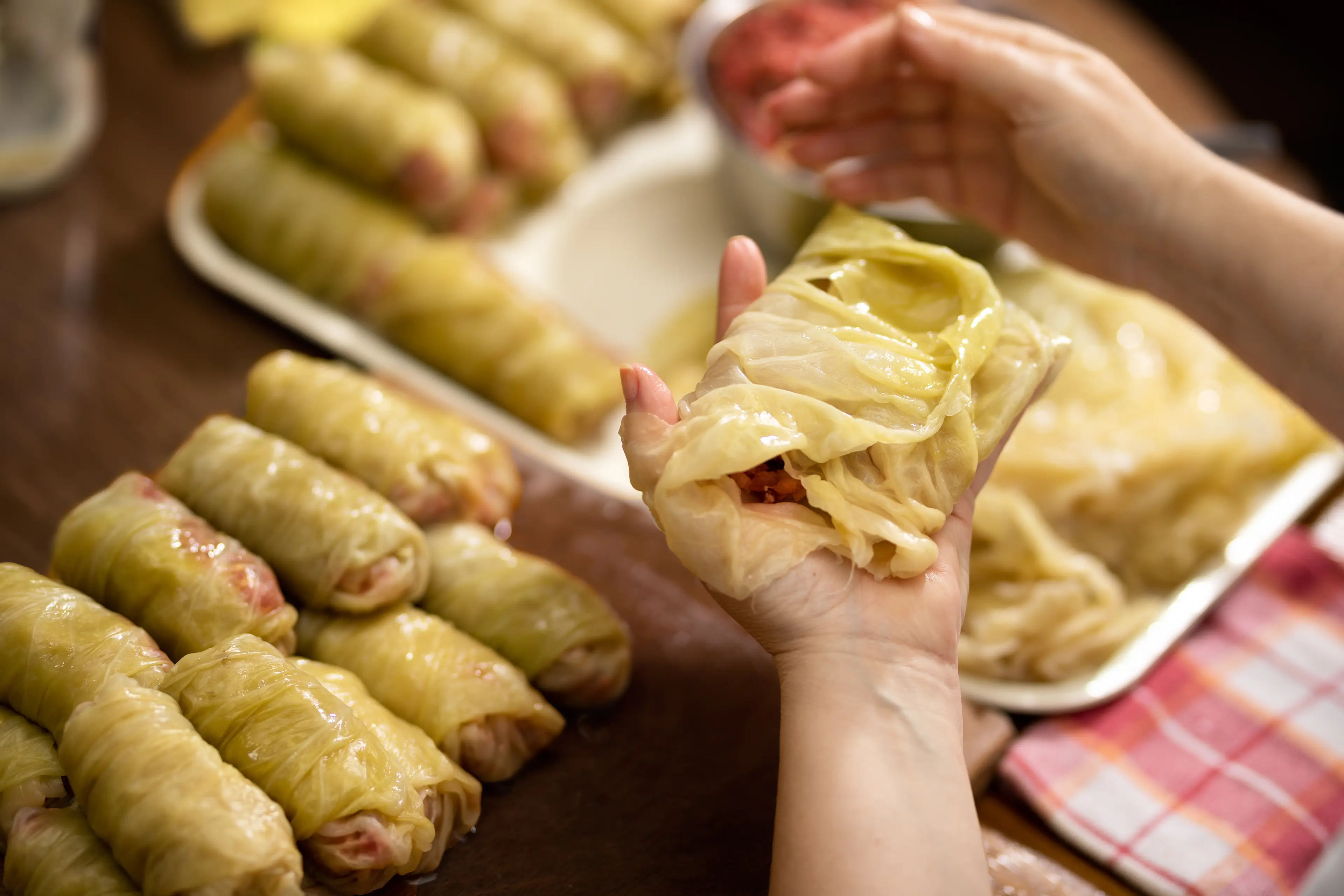
Sarma
Sarma is a traditional Balkan dish made from minced meat and rice wrapped in pickled cabbage leaves. It's a hearty, comforting dish that's popular in the region around Plitvice Lakes National Park.
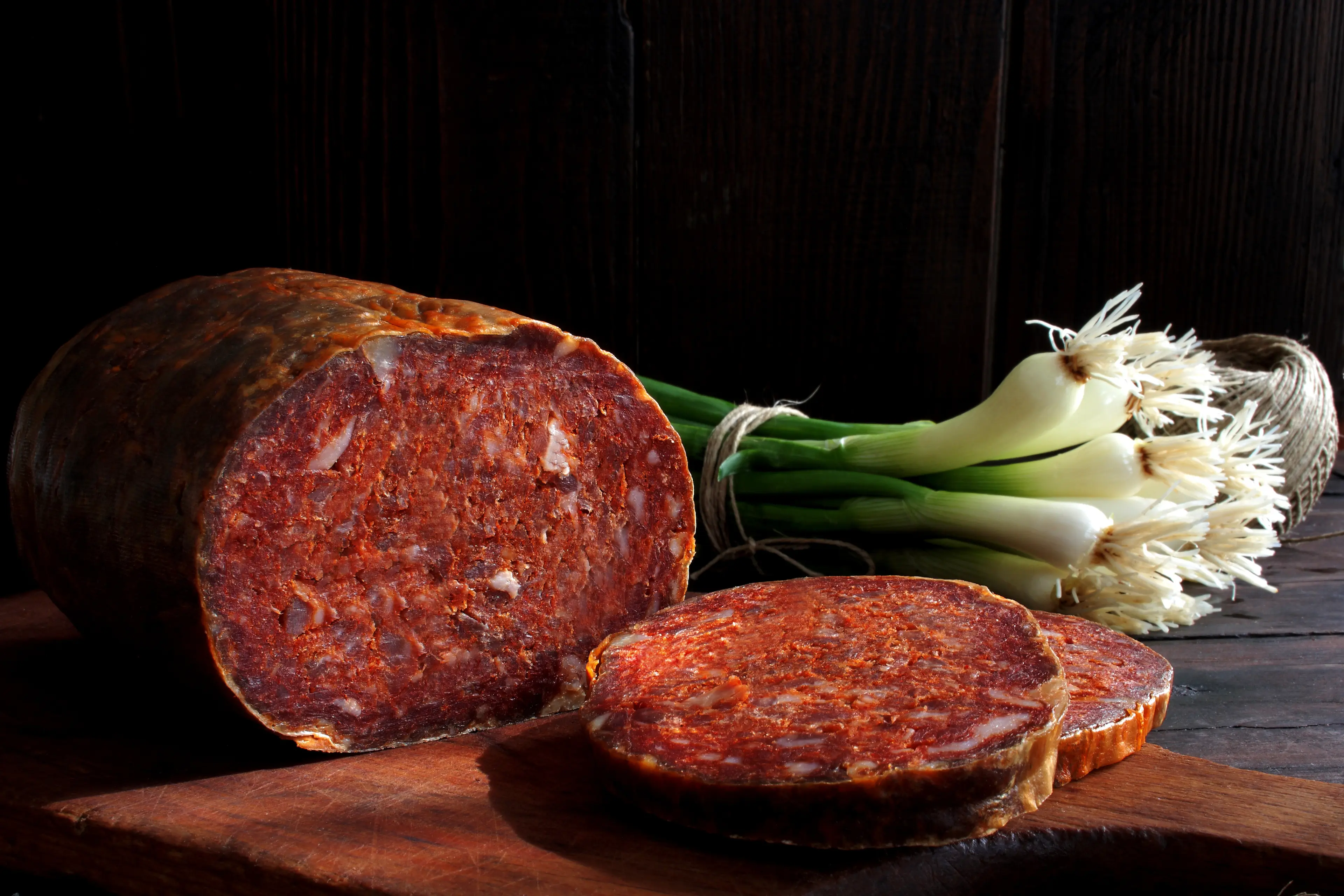
Kulen
Kulen is a type of spicy, smoked sausage that's a specialty of the region. It's often served as an appetizer or snack and is a must-try for visitors to Plitvice Lakes National Park.
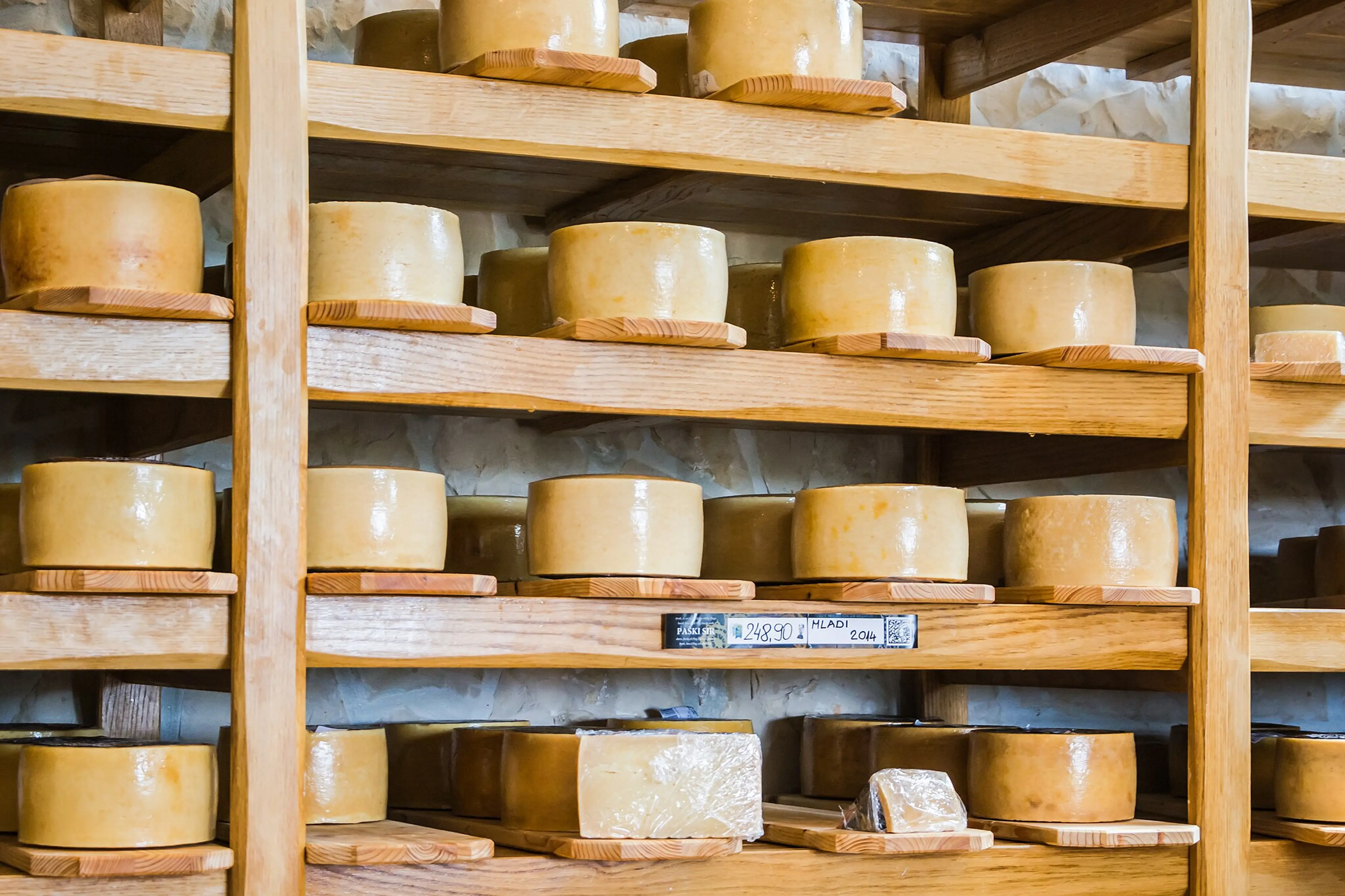
Paški Sir
Pag cheese is a hard, sheep's milk cheese from the island of Pag. It's known for its unique flavor, which comes from the island's salty, windswept pastures. It's a popular appetizer in the region around Plitvice Lakes National Park.
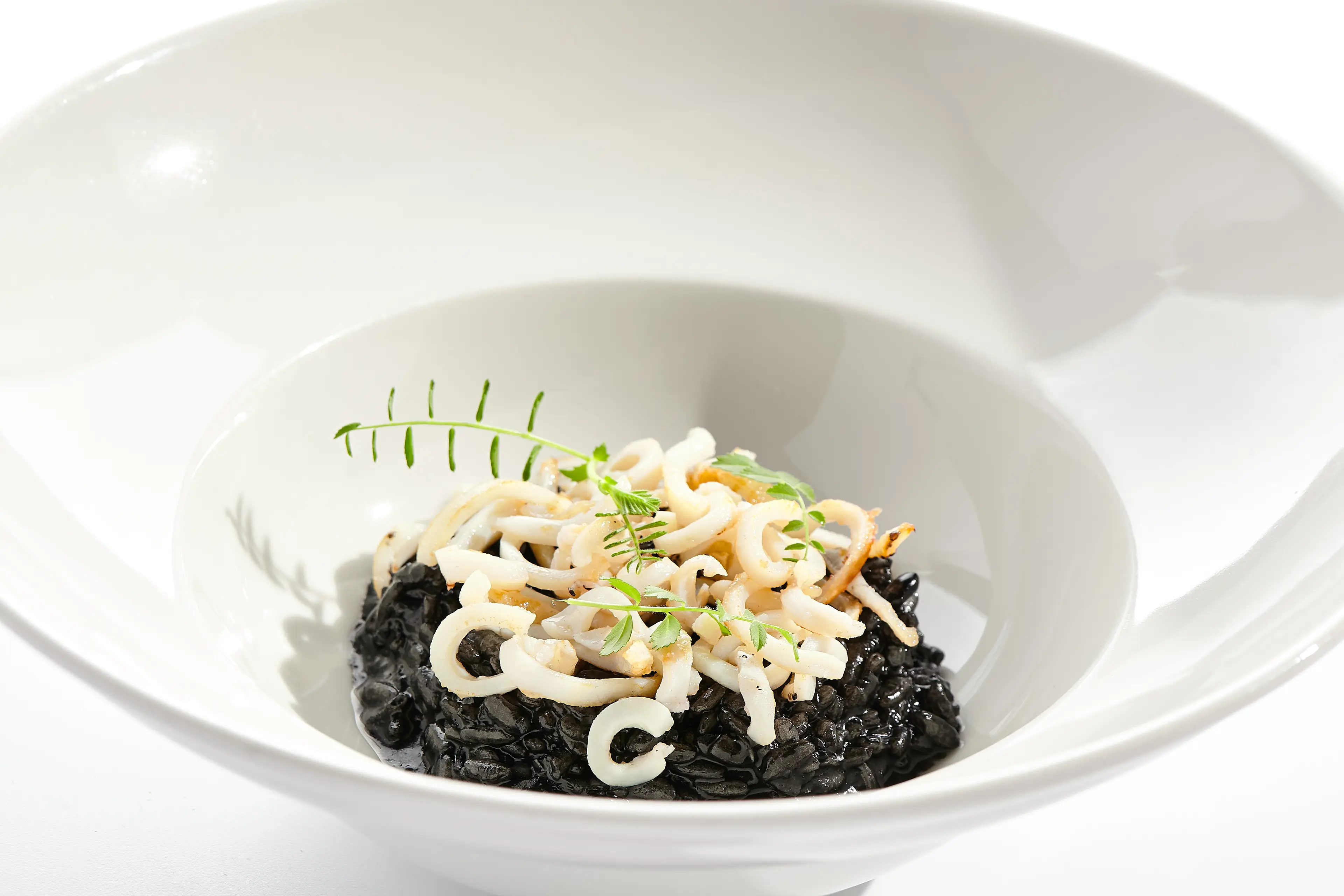
Black Risotto
Black Risotto is a Croatian dish made with cuttlefish or squid, rice, and a generous amount of squid ink, which gives the dish its characteristic black color. It's a popular seafood dish in the region around Plitvice Lakes National Park.
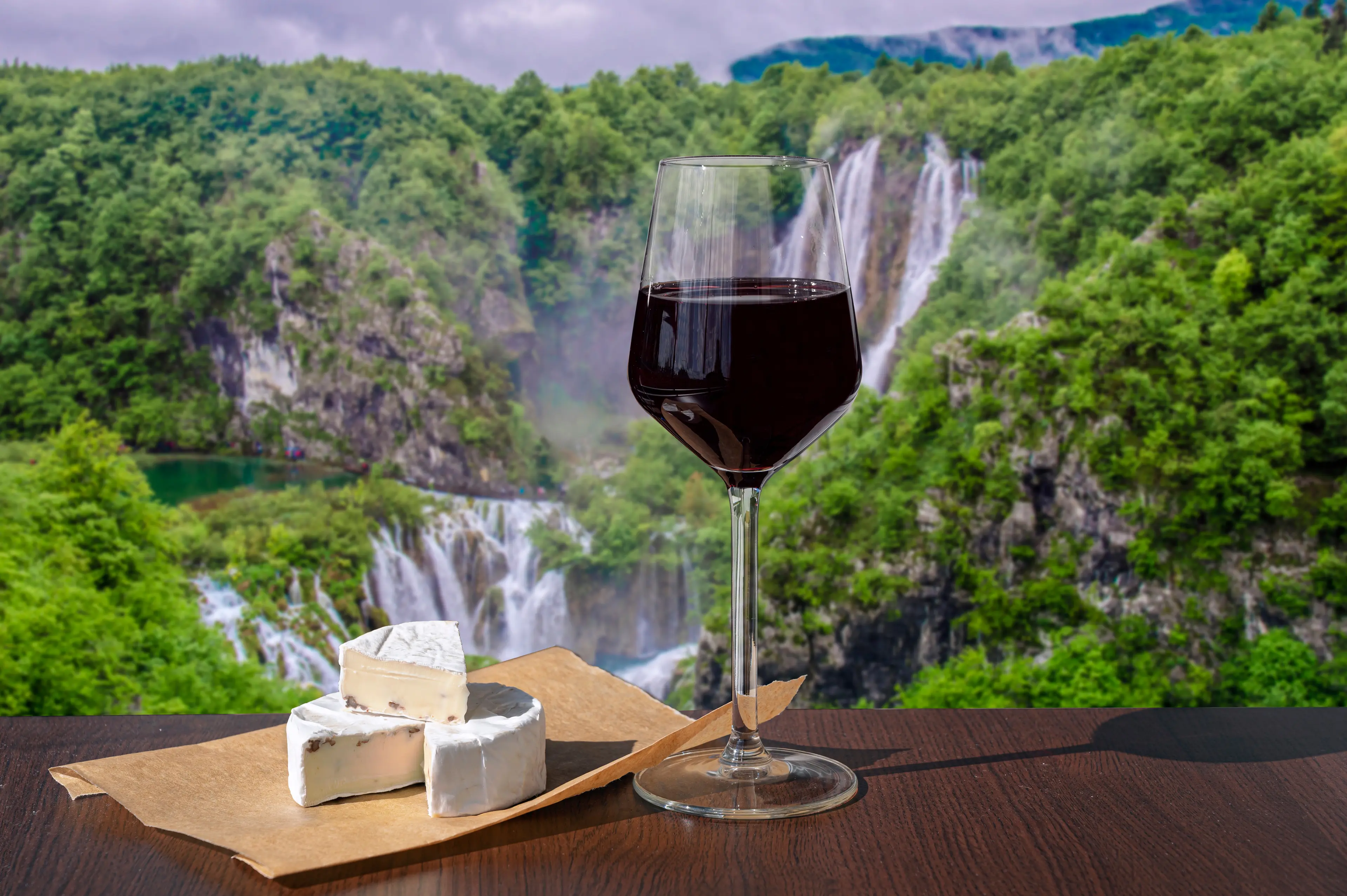
Prosek
Prosek is a traditional Croatian dessert wine. It's sweet and strong, often served with dessert or cheese. It's a popular drink in the region around Plitvice Lakes National Park.
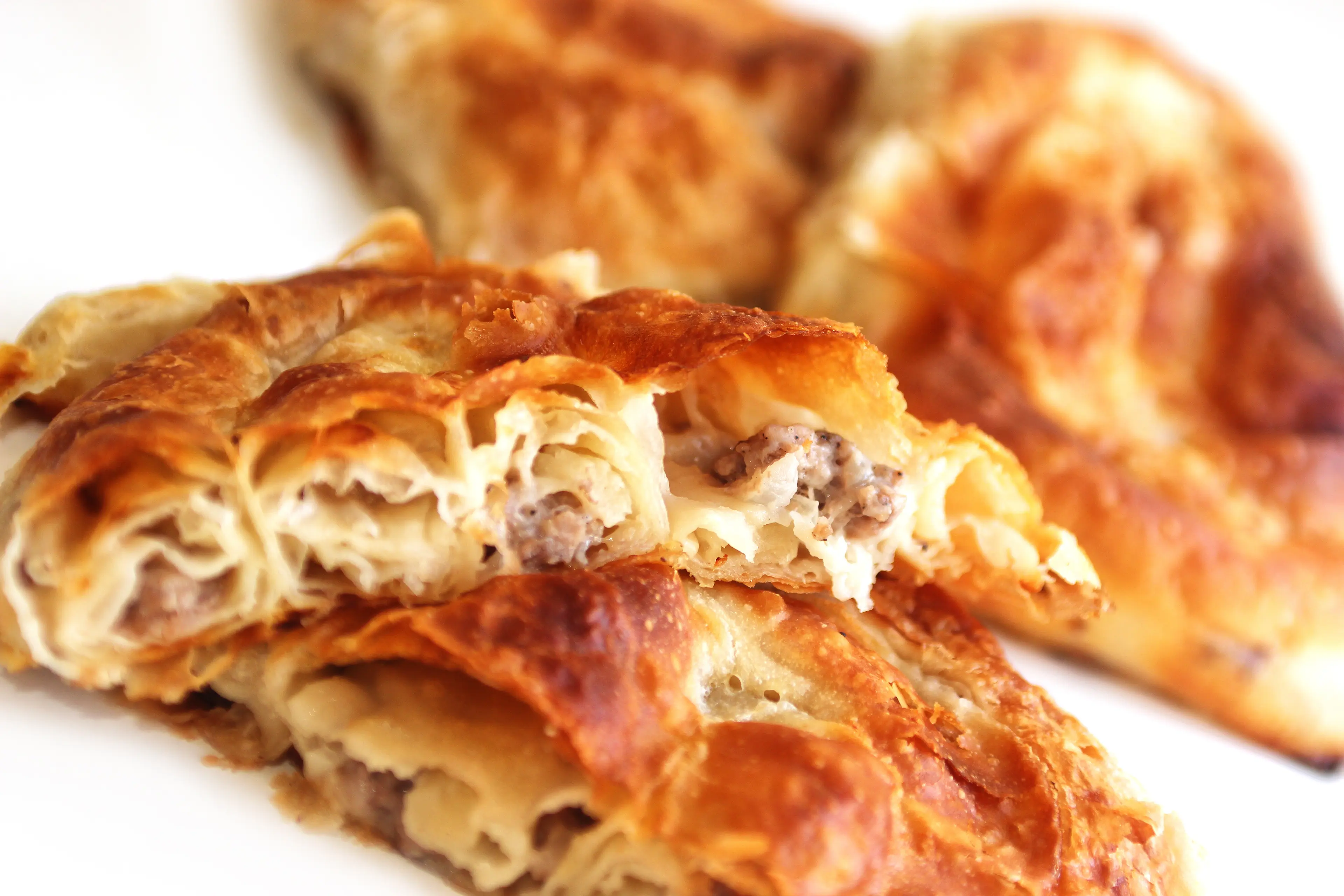
Burek
Burek is a flaky, savory pastry filled with cheese, meat, or spinach. It's a popular snack or breakfast food in the region around Plitvice Lakes National Park.
Best time to visit
The best time to visit Plitvice Lakes National Park in Croatia is between April and October. During these months, the weather is generally pleasant and the park is fully open to visitors. The waterfalls are particularly impressive in the spring (April-June) when the water levels are high. The park is also stunning in the fall (September-October) when the leaves change color. However, it's worth noting that July and August are the busiest months, so if you prefer a less crowded experience, consider visiting in the shoulder seasons (April-June or September-October).
How to get around
Foot
The park is well-equipped with wooden walkways and trails that allow visitors to explore the area on foot. This is the most common and recommended way to see the park as it allows you to take in the stunning views at your own pace.
Electric Boat
The park offers electric boat rides across the Kozjak Lake. This is a great way to see the park from a different perspective and to reach the Upper Lakes area.
Panoramic Train
A panoramic train ride is available within the park. This is a great option for those who want to see a large portion of the park without having to walk long distances. The train stops at several points, allowing visitors to hop on and off as they please.
Car
While cars are not allowed inside the park, they can be used to reach the park entrances. There are two main entrances, Entrance 1 (Rastovača) and Entrance 2 (Hladovina), both of which have parking lots.
Bus
There are regular bus services from major cities like Zagreb, Zadar, and Split to Plitvice Lakes National Park. Once at the park, visitors can use the park's internal transport system (electric boats and panoramic trains) to get around.
Ridesharing
Ridesharing services like Uber are available in Croatia, but may not be the most convenient option for reaching the park due to its remote location. However, they can be used for transport to and from nearby towns or cities.
Important information
Currency€ EUR
Time zoneUTC+1
Driving sideRight
Emergency phone112
Drinking waterYes
Power sockets
Voltage230 V
Things to know about Plitvice Lakes National Park, Croatia as a first time visitor
1
Plitvice Lakes National Park is open year-round, but the best time to visit is between April and October when the weather is pleasant.
2
The park's operating hours vary by season. In the summer, it's open from 7 am to 8 pm, while in the winter, it's open from 8 am to 4 pm.
3
The park is divided into two sections: the Upper Lakes and the Lower Lakes. Each has its own entrance.
4
There are four different hiking routes to choose from, each varying in length and difficulty.
5
The park is home to a diverse range of wildlife, including bears, wolves, and many species of birds. However, they are rarely seen by visitors.
6
There are no restaurants within the park, but there are several picnic areas. It's recommended to bring your own food and water.
7
The park's terrain can be challenging, with steep hills and uneven paths. Wear comfortable, sturdy shoes.
8
Swimming is not allowed in the lakes to preserve the natural environment.
9
The park is very popular, so it can get crowded, especially during the summer months. Arrive early to avoid the crowds.
10
There are shuttle buses and electric boats within the park to help visitors get around.
11
The park's waterfalls are most impressive in the spring when the snowmelt increases the water flow.
12
The park's weather can be unpredictable. Even in summer, temperatures can range from 50°F (10°C) to 86°F (30°C). Always check the forecast before your visit.
13
There are several hotels and guesthouses near the park if you wish to stay overnight.
14
The park charges an entrance fee, which varies by season. In the peak season (July and August), it's around $40 for adults.
15
The park's paths can be slippery, especially after rain. Be careful and watch your step.
16
There are no ATMs within the park, so bring enough cash for your visit.
17
The park is a UNESCO World Heritage site, so respect the environment and follow the park's rules.
18
Pets are allowed in the park, but they must be kept on a leash at all times.
19
The park offers guided tours, which can be a great way to learn more about the park's history and ecology.
20
In winter, the park can be covered in snow, making it a beautiful but challenging place to explore. Some paths may be closed due to icy conditions.
Basic Croatian to know as a first time visitor
English phrase | Native phrase | Pronunciation | When to use it |
|---|---|---|---|
Hello | Bok | bohk | Greeting someone |
Goodbye | Doviđenja | doh-vee-jen-ya | Leaving or saying goodbye |
Please | Molim | moh-leem | Making a request |
Thank you | Hvala | hva-la | Showing appreciation |
Yes | Da | dah | Answering affirmatively |
No | Ne | neh | Answering negatively |
Excuse me | Oprostite | oh-proh-stee-teh | Getting attention or apologizing |
I don't understand | Ne razumijem | neh rah-zoo-me-yem | When you don't understand something |
Do you speak English? | Govorite li engleski? | goh-voh-ree-teh lee eng-les-kee? | Asking if someone speaks English |
Where is...? | Gdje je...? | gdye yeh...? | Asking for directions |
Bathroom | Kupaonica | koo-pah-on-ee-tsah | Looking for a bathroom |
Help | Pomoć | poh-mohch | In case of emergency |
Food | Hrana | hra-na | Looking for something to eat |
Water | Voda | vo-da | Looking for water |
Entrance | Ulaz | oo-laz | Looking for the entrance |
Exit | Izlaz | ee-zlaz | Looking for the exit |
Ticket | Karta | kar-ta | Buying a ticket |
How much does it cost? | Koliko to košta? | ko-lee-ko toh kosh-ta? | Asking for the price |
I am lost | Izgubljen sam | eez-goo-blee-yen sam | When you are lost |
Can you help me? | Možete li mi pomoći? | mo-zhe-teh lee mee poh-moh-chee? | Asking for help |
Packing List
Clothing
Comfortable walking shoes
Lightweight clothing
Warm clothing for cooler evenings
Rain jacket or umbrella
Swimwear (for hotel pool)
Sunglasses
Hat
Toiletries
Travel-size shampoo and conditioner
Travel-size body wash
Toothbrush and toothpaste
Deodorant
Razor and shaving cream
Sunscreen
Insect repellent
First aid kit
Prescription medications
Travel documents and essentials
Passport/ID
Flight tickets
Hotel booking confirmation
Travel insurance documents
Credit cards and cash
Maps and guidebooks
Electronics and gadgets
Smartphone
Charger for smartphone
Portable power bank
Digital camera
Memory cards for digital camera
Headphones
Miscellaneous items
Snacks and water bottles
Travel pillow and blanket
Books or e-books for leisure reading
Binoculars for wildlife viewing
Reusable shopping bag
Travel-size laundry detergent packets
Weather Conditions
When planning a trip to Plitvice Lakes National Park in Croatia, it's important to consider the weather as it can greatly impact your experience. The park experiences a mix of continental and maritime climates, leading to a wide range of weather conditions throughout the year. Spring (March to May) is a beautiful time to visit, with temperatures ranging from 50°F to 70°F (10°C to 21°C). The park starts to bloom and the waterfalls are at their most powerful due to the melting snow. However, it can be quite rainy, so pack waterproof clothing and sturdy shoes. Summer (June to August) is the warmest period with temperatures often reaching up to 80°F (27°C). It's the busiest time of the year, so expect crowds. Don't forget your sun protection and stay hydrated. Autumn (September to November) offers a spectacular display of fall colors. Temperatures can range from 45°F to 65°F (7°C to 18°C). Rainfall is common, so again, waterproof clothing is recommended. Winter (December to February) is the coldest season with temperatures often dropping below freezing, sometimes as low as 23°F (-5°C). The park transforms into a winter wonderland with frozen waterfalls and snow-covered paths. If you're planning to visit during this time, pack warm clothing, and be aware that some paths may be closed due to ice. Regardless of when you visit, always check the local weather forecast before setting out for the day. The weather can change quickly in the park, and being prepared will ensure you have the best experience possible.
| Month | Hi / Lo (°C) | Weather Overview |
|---|---|---|
January | 5° / -5° | January is the coldest month in Plitvice Lakes National Park, with temperatures often dropping below freezing. Snowfall is common, creating a magical winter wonderland. |
February | 7° / -3° | February is still quite cold, with a chance of snow. However, the days start to get a bit longer, allowing more time to explore the park. |
March | 10° / 0° | March sees the beginning of spring, with temperatures slowly rising. The snow starts to melt, revealing the park's greenery. |
April | 17° / 3° | April is a pleasant month to visit, with mild temperatures and blooming flowers. Rain showers are common, so pack an umbrella. |
May | 22° / 8° | May is a great time to visit, with warm temperatures and the park in full bloom. It's also less crowded than the summer months. |
June | 24° / 12° | June marks the beginning of summer, with long, sunny days. It's a popular time to visit, so expect some crowds. |
July | 25° / 15° | July is the hottest month, perfect for hiking and exploring. However, it's also the busiest month, so book accommodations in advance. |
August | 25° / 15° | August is similar to July, with hot temperatures and lots of tourists. It's a great time to enjoy the park's waterfalls. |
September | 20° / 10° | September is a lovely month to visit, with fewer tourists and mild temperatures. The leaves start to change color, adding to the park's beauty. |
October | 15° / 5° | October sees cooler temperatures and the peak of fall foliage. It's a great time to enjoy the park's autumn colors. |
November | 10° / 0° | November is a quiet month in the park, with cooler temperatures and fewer tourists. The leaves have mostly fallen, giving the park a different kind of beauty. |
December | 7° / -3° | December is a cold month, with short days and a chance of snow. It's a quiet time in the park, perfect for those who enjoy solitude. |
Did you know?
Places near by Plitvice Lakes National Park, Croatia

Rastoke
Historic watermill village with traditional architecture and waterfalls

Barać Caves
Impressive underground caves with guided tours

Zadar
Historic city with Roman and Venetian ruins, the Sea Organ and the Sun Salutation

Zagreb
Croatia's capital city, known for its 18th and 19th-century Austro-Hungarian architecture

Krka National Park
Famous for its large number of waterfalls and flora and fauna

Split
Known for its beaches and the fortresslike complex at its center, Diocletian's Palace

Pula
Known for its protected harbor, beach-lined coast and Roman ruins

Rijeka
Known for its historic sites, including Trsat Castle, and a vibrant food scene

Dubrovnik
Historic coastal city known for its distinctive Old Town, encircled with massive stone walls


